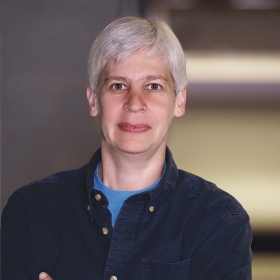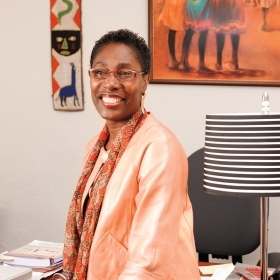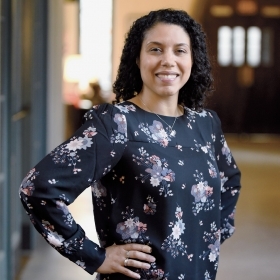Miriam Butt ’87
Miriam Butt ’87, a professor of general and computational linguistics at the University of Konstanz in Germany, chose to attend Wellesley in part because it was one of the only American colleges at the time where she could study both Latin and computer science.

Miriam Butt ’87 has always been sensitive to the nuances of language. One of her early memories is being asked by her pediatrician at age 6 or 7 if she could count to 20. “In which language?” she replied, to the doctor’s astonishment.
Miriam, a professor of general and computational linguistics at the University of Konstanz in Germany, was born in Saudi Arabia, the daughter of a German journalist mother and a Pakistani engineer father, who was working to bring electricity to the country.
She grew up speaking German, Urdu, and English, “with a bit of Arabic thrown in,” and today, she and her partner are continuing that tradition by raising their 10-year-old twins in a bilingual German-English speaking household.
Perhaps it was the influence of a mother who loved the written word and a father who built useful things that led Miriam to an unconventional career for a linguist—one that straddles the sciences and the humanities. Miriam, who is president of the German Linguistic Society, is a linguist in the traditional sense, well-known for her work on case and complex predicates in South Asian languages, but she is also the rare linguist who is fluent, so to speak, in the language of computers and computer programming.
She chose to attend Wellesley in part because it was one of the only American colleges at the time where she could study both Latin and computer science: Latin, because she had fallen in love with antiquity and the structure of the language, which she began studying during her elementary school years in Germany; and computer science, she says with a laugh, because, “In those days, in Pakistan”—where she attended high school—“you couldn’t convert your rupees to U.S. dollars to finance an education abroad unless you studied something ‘useful,’ such as air conditioning or detective work.” Or computer science.
Miriam knew she enjoyed coding in the BASIC computing language from a course she took at the Lahore American School, which she has described as having “quite a forward-looking curriculum for the early ’80s in a school in Pakistan.”
After graduating from Wellesley, she spent a year working as a full-time intern in an early iteration of the College’s computer lab before heading to Stanford to complete a Ph.D. in linguistics. Much of her recent research involves “natural language processing,” a branch of computer science that uses software to analyze language in text and speech.
At the University of Konstanz, she is the sole linguist among an interdisciplinary group of researchers—one of only 11 specially designated “clusters of excellence” in Germany—that studies the politics of inequality. She is currently working on projects that sift through large volumes of political texts, such as newspaper articles, tweets, social media posts, and political party tracts, and analyze their framing devices: the linguistic choices that mobilize people to action, be it getting out to vote or joining a riot.
She is also working with university partners in Lahore on text-to-speech systems. About 40% of the adult population of Pakistan is illiterate (more than 60 million people), but many people have cell phones. She is working on a program that would allow users to scan an image of a text with a phone and then have the phone read that text aloud.
In a discipline that is often accessible only to a handful of narrowly focused academics, Miriam’s work has a potentially wide-reaching impact. “I like learning and thinking about linguistic structures, but I have a need to be useful,” she says.


